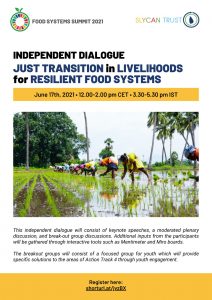الملاحظات التقييمية الرسمية على الحوارات إلى قمة الأمم المتحدة للنظم الغذائية لعام 2021
نوع الحوار
بدعوة من
لغة فعالية الحوار
التاريخ/الوقت
إلى:
المدينة
نطاق التركيز الجغرافي
التنسيق
يُرجى مراجعة التفاصيل أدناه للحصول على معلومات التسجيل إذا كانت متوفرة أو الاتصال بمنظم الحوار إذا كنت ترغب في الحضور.
القيّم
الوصف
Food systems around the globe are vulnerable to the impacts of climate change, which are set to become more frequent and intense over the coming decades. Crop cultivation, livestock, fisheries and aquaculture, as well as related sectors such as forestry are heavily affected by changes in weather patterns, extreme weather events, and slow-onset processes such as sea level rise, soil degradation, and loss of ecosystem services.
Climate change exacerbates existing social and economic vulnerabilities in food producers, communities, and supply and value chains. A just transition will be vital to enable more resilient development and help protect lives, livelihoods, businesses, public finances, and infrastructure. Just transition should be embedded into national and global policy frameworks related to climate change and sustainable development, including the Nationally Determined Contributions under the Paris Agreement, National Adaptation Plans, and the Sustainable Development Goals.
The following main thematic area and objectives will be addressed throughout the session:
- Identify through an inclusive and participatory process solutions to be introduced under Action Track 4 and its three action areas, in particular related to just transition and building equitable and inclusive resilience in food systems.
- Gain further input on the roles of different stakeholders and multi-actor partnerships including government, private sector, civil society, and local communities.
- Build on the technical capacity of key stakeholders working on the topic of adaptation and mitigation, just transition, and food system resilience.
- Identify entry points for integrating context-specific and holistic just transition approaches into national and international policies, plans, and processes and existing infrastructure.
- Highlight and further explore the role of Nationally Determined Contributions, National Adaptation Plans, other relevant processes and mechanisms under the UNFCCC, and the SDGs.
- Integration of resilience-building and social protection among youth and women and the inclusion of gender and youth empowerment in planning and policy processes.
- Discuss implications of human mobility and informal employment for just transition in food systems.
- Connect just transition to just recovery from COVID-19, and resilience-building in food system livelihoods.
- Share knowledge, experiences, best practices, and lessons learned.
الشكر والتقدير


